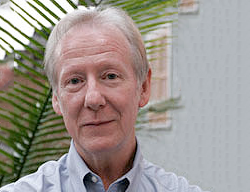News & Events
Rockefeller Foundation selects Lindahl-led project as Bellagio conference
Dr. Carl Lindahl organizing July 2014 international disaster recovery symposium

The Rockefeller Foundation has identified the research of Dr. Carl Lindahl on how people survive and cope during major calamities as an “impact-oriented solution to a critical global problem.”
The Foundation has expressed that recognition by providing Dr. Lindahl with the use of the Bellagio Center in northern Italy to host the “Survivor-Centered Responses to Massive Disasters” conference in July 2014. Dr. Lindahl is the Martha Gano Houstoun Research Professor in the Department of English and Director of the Houston Folklore Archive.
The three-day symposium will convene 19 scholars, ethnographers and public health specialists from five nations – Haiti, Italy, Japan, Sierra Leone and the United States – to strategize ways to help disaster survivors become active agents in their own recoveries.
The conference stems from work Dr. Lindahl, a folklorist in the Department of English, started with the Surviving Katrina and Rita in Houston Project, which he co-founded in the wake of Hurricane Katrina.
It was the world’s first disaster response effort to encourage and enable disaster survivors to take the lead in documenting their own experience of disaster.
Through the project, Dr. Lindahl and co-director Pat Jasper provided hurricane survivors with free training, as well as pay to record the stories of fellow evacuees in the Houston area.
The University of Houston supported the project with the use of its facilities, the American Folklife Center at the Library of Congress provided personnel to the project and the Houston Endowment gave funding.
“Through the acts of sharing their stories, the survivor interviewers and survivor interviewees formed networks based on shared experience and shared afflictions; these bonds in turn strengthened their sense of community and aided in their recovery,” said Dr. Lindahl.
“The impact of survivor-to-survivor interviews on the participants’ behavioral health was so positive that our project was awarded mental health funding after two years of demonstrated results,” he said. “An approach that began at the University of Houston in the wake of Hurricane Katrina is now being adapted to respond to large-scale disasters in many nations.”
At the 2014 Bellagio Center conference, participants will refine current healing strategies for global implementation to improve the living conditions and emotional health of disaster survivors worldwide.
In the nations that will be represented at the Bellagio Center conference, there are ethnographers trained in how to listen to and engage survivors in their emotional recoveries. These ethnographers will report on their findings, discuss how to refine their responses, and then leave to apply immediate, on-the-ground implementation strategies for use in Haiti, Italy, Japan, and Sierra Leone.
Those four nations have experienced natural and man-made disasters that have permanently altered the lives of their citizens and the landscapes within their borders – the 2010 earthquake that devastated Haiti; the 2012 and 2013 earthquakes in northern Italy, the 2011 earthquake, tsunami and nuclear crisis in Japan; and the persisting after effects of the displacements caused by civil war that ravaged Sierra Leone from 1991 to 2002.
“The survivors are the real experts in these disasters and the people most invested in the emotional healing of their communities,” Dr. Lindahl said. “By listening to the survivors and helping them share their stories and use their own traditional healing techniques, we can support the internal strength of the community in a process of self-healing.”
The Bellagio Center is a 50-acre property on a peninsula between lakes Como and Lecco in northern Italy. The Rockefeller Foundation has owned the property since 1959 and uses it to house residency programs for scholars, artists, thought leaders and policymakers and to host its own conferences related to the Foundation’s mission “to promote the well-being of humanity.”
About a third of the Bellagio Center conferences are organized by the Foundation. The rest, like the UH conference are “arranged by people and institutions that share in the Foundation’s vision of expanding opportunities for poor or vulnerable people,” according to the foundation website. Externally-organized conferences submit applications that are rigorously reviewed and the space is awarded on a competitive basis.
“I look upon this conference as the fruit of work that began right here at the University of Houston,” said Dr. Lindahl. “I want survivor-centered disaster response to continue to be identified with the University of Houston. Three University of Houston teachers will attend the conference in Bellagio, and I am urging the university community to join us in planning for a follow-up conference in 2015 to gauge our success and inspire further refinements and applications in our effort to address a major global problem.”
For more information about the research project, please visit: http://www.survivingkatrinaandrita.dgs-sites.com/index.php
For more information about the Rockefeller Foundation’s Bellagio Center, please visit: http://www.rockefellerfoundation.org/bellagio-center
- By Shannon Buggs